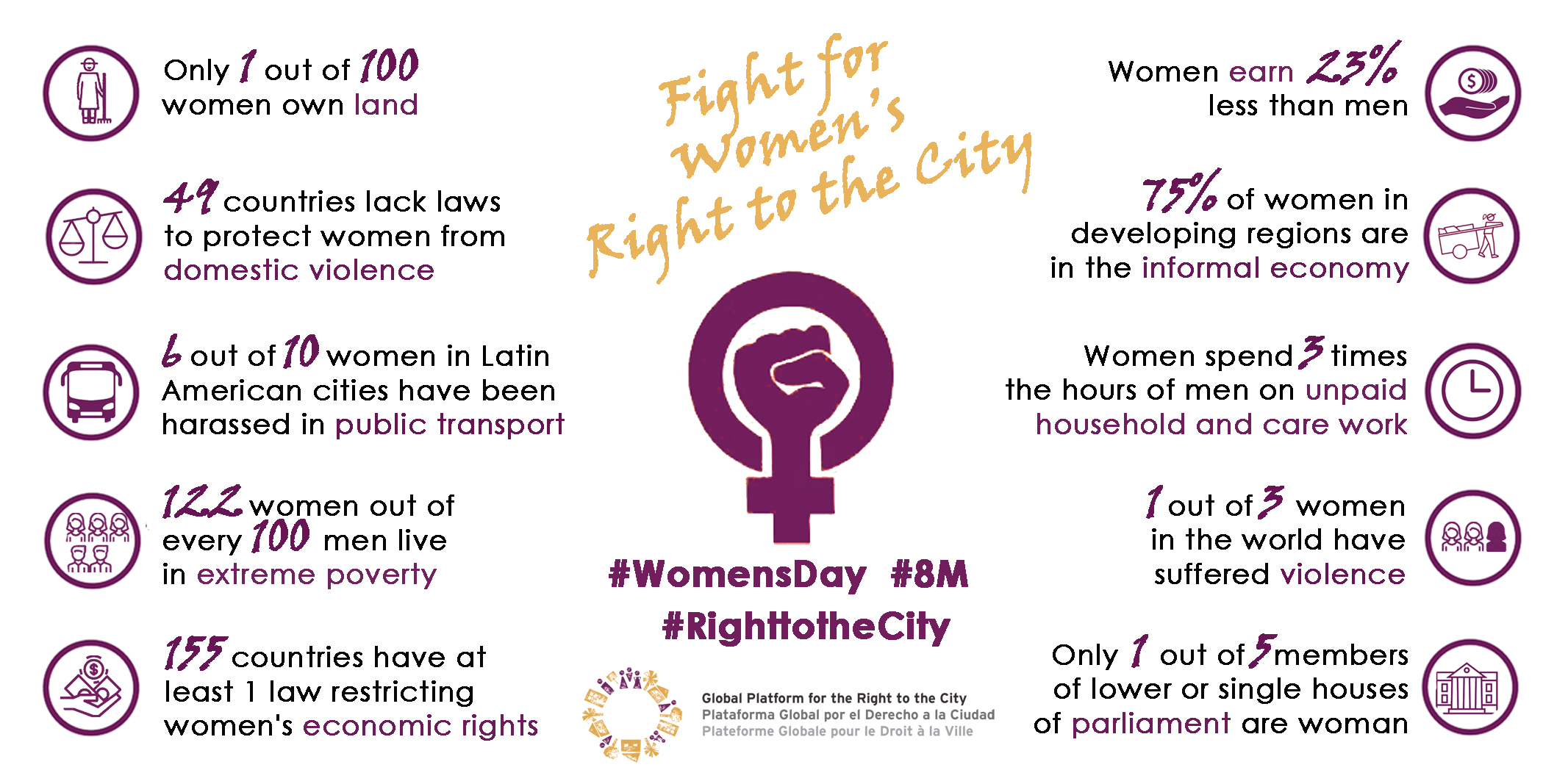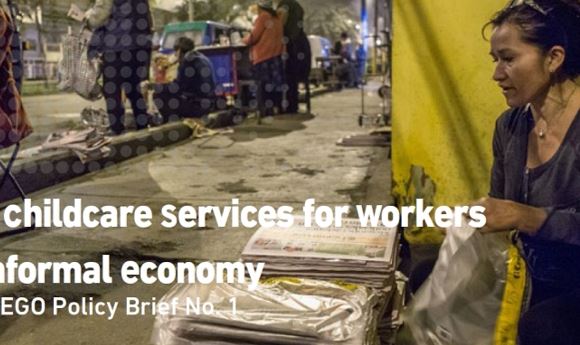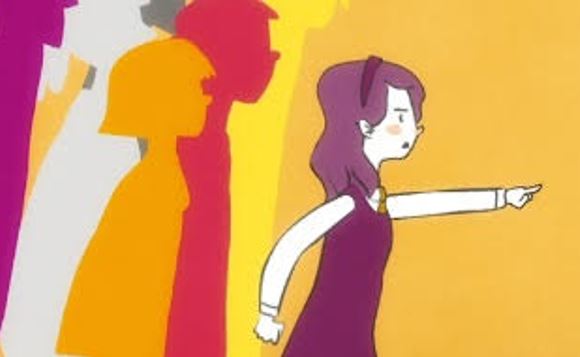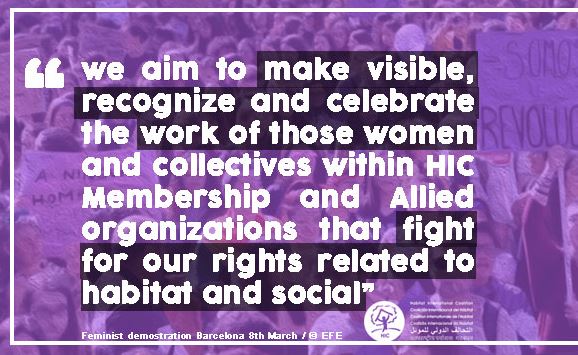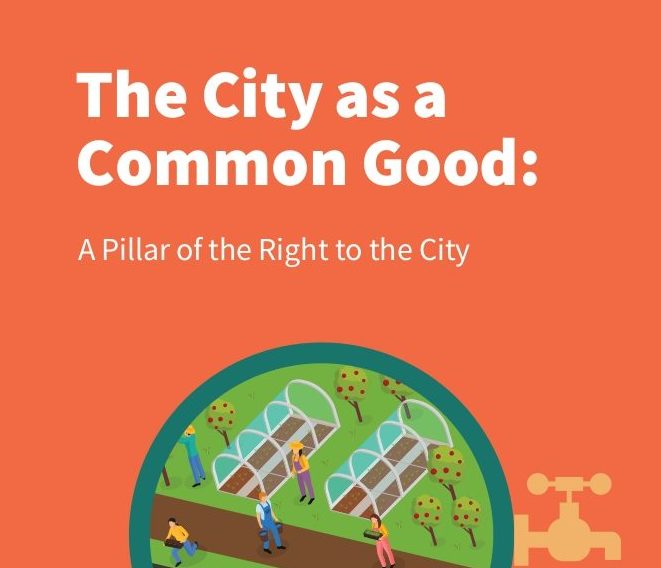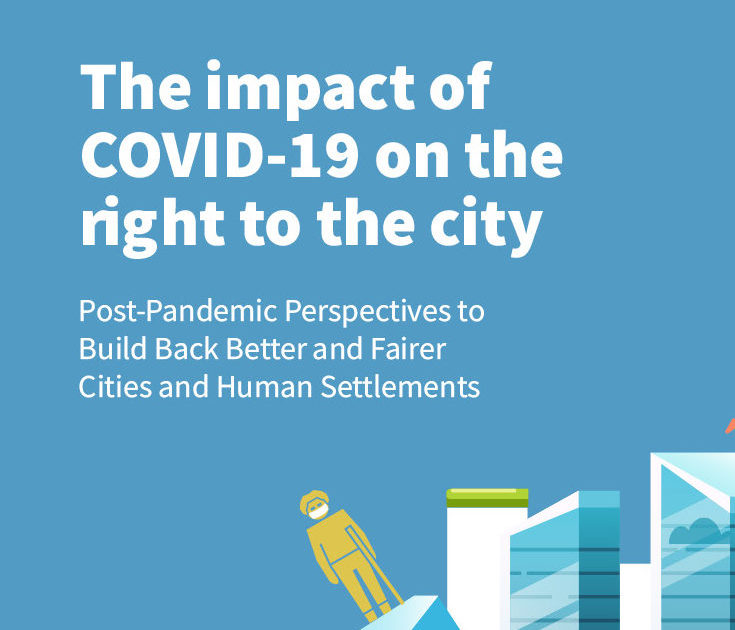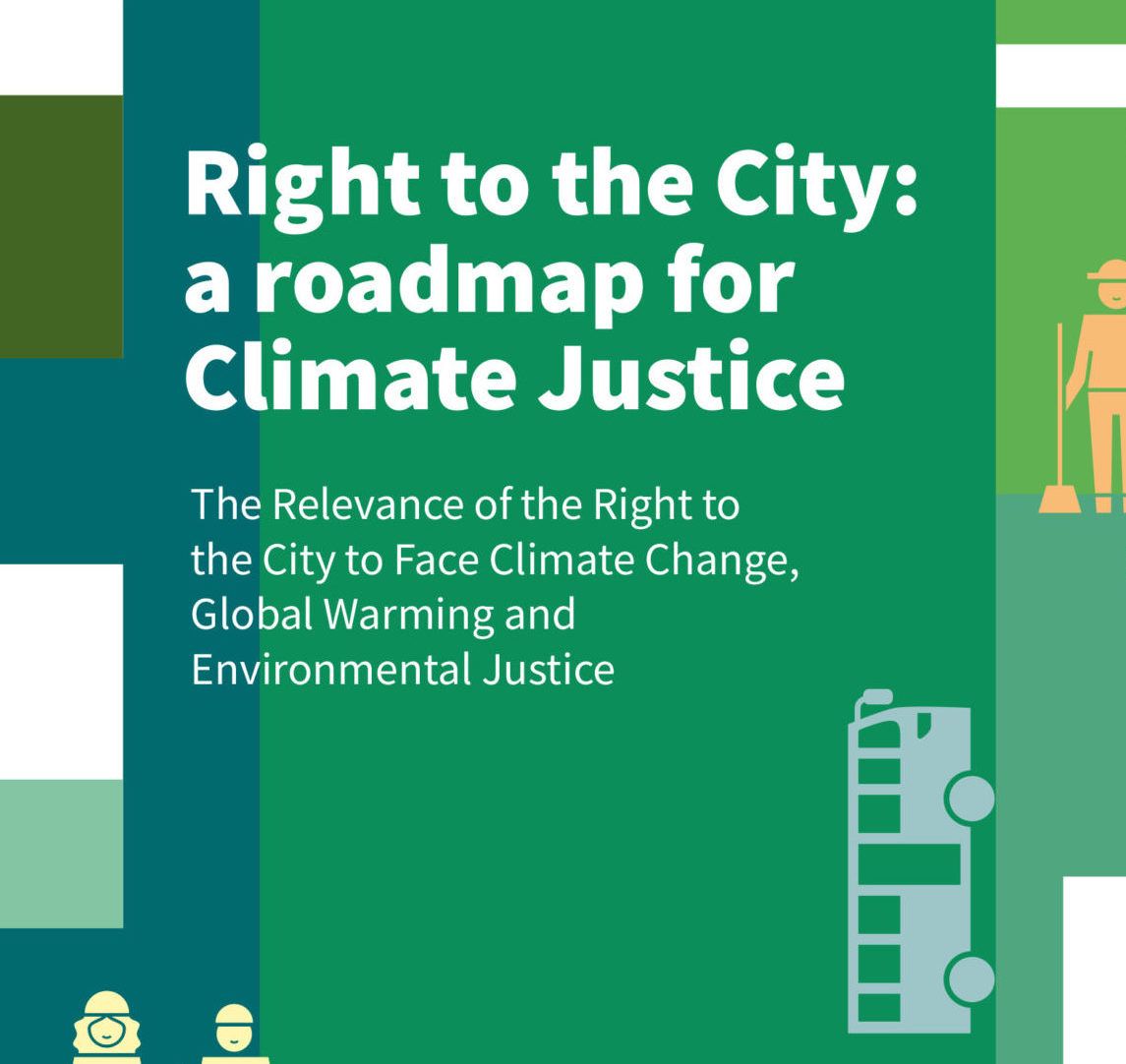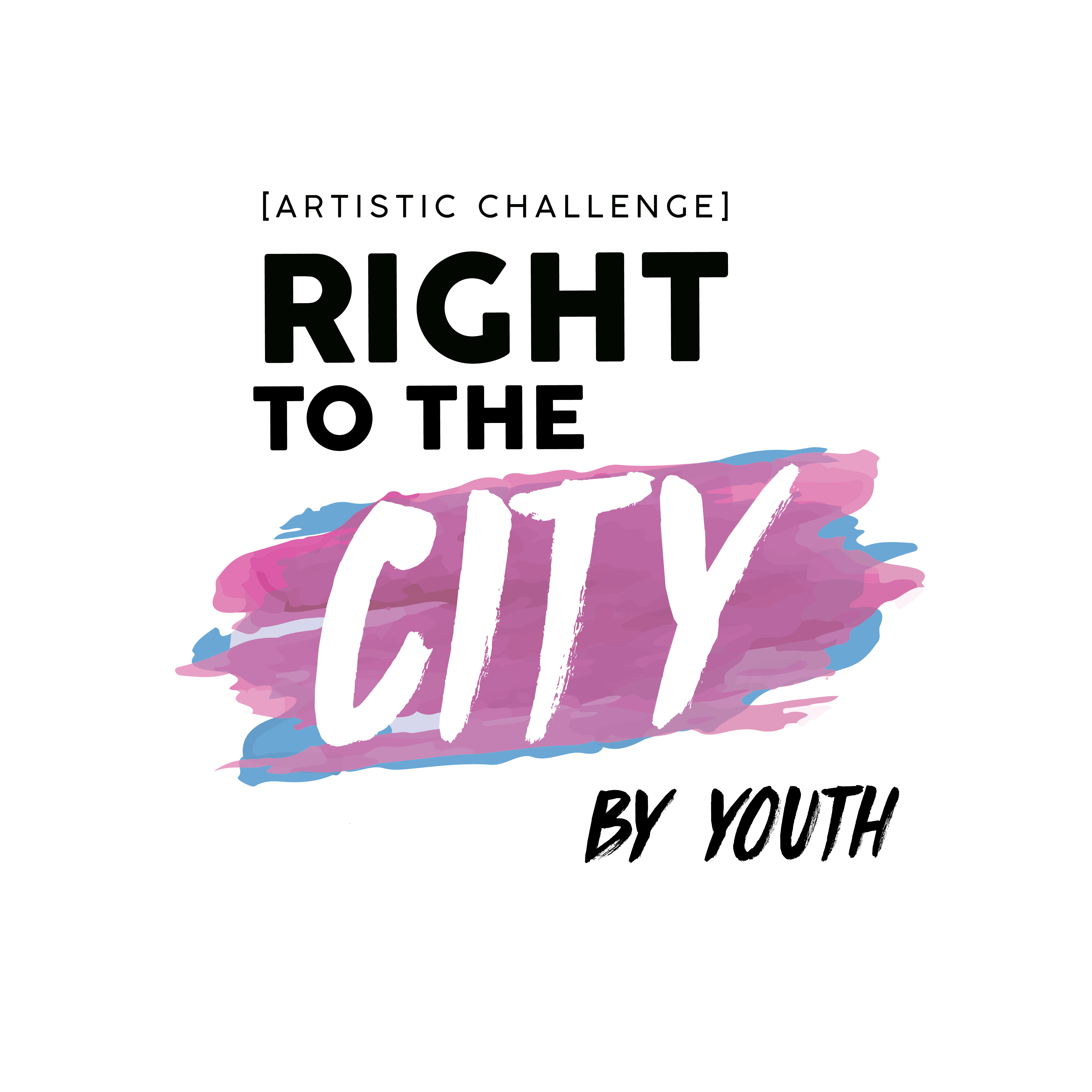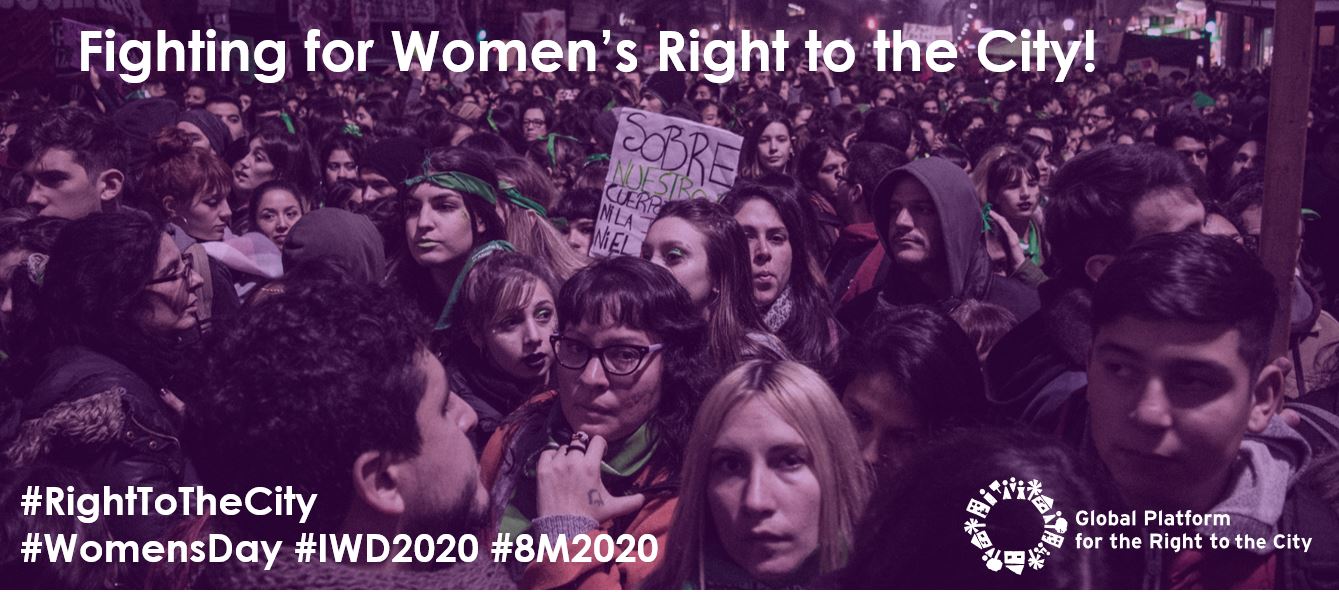
As every year, on March 8 we celebrate International Women’s Day
This day and the month of March as a whole is a key moment in the feminist struggle around the world. Gender equality is one of the eight components of the right to the city and one of its central elements. There can be no right to the city without gender equality. From the Global Platform for the Right to the City (GPR2C) we fight for cities and human settlements that adopt all necessary measures to combat discrimination against women and girls in all its forms; for cities/human settlements that take all appropriate measures to ensure the full development of women and girls, guaranteeing them equality in the exercise and realization of human rights, and a life free of violence.
We join the global mobilization, calling for Women’s Right to the City and making visible the contribution of organizations working on this issue. As Ana Falú, coordinator of the GPR2C’s Gender Working Group explains in this article, “talking about the Right of Women to the City is a matter of social justice, of changing the cultural paradigm, to understand not only the complexity of cities but also of identities, the people for whom we are advocating the Right to the City”.
Women’s Right to the City Manifesto
In 2019, the GPR2C launched a manifesto for Women’s Right to the City developed by its Gender Working Group and supported by 29 social, academic, political and grassroots leaders and representatives at the international level. The document responds to the question “Why do we speak of Women’s Right to the City?” with 11 central points to ensure the Right to the City of Women.
In this video 10 expert women leaders and activists from around the world who fight for gender equality and the Right to the City explain some of the central themes of the manifesto.
The Right to the City at International Women’s Day 2020
Women’s Right to the City has a political and theoretical value. Political because of the capacity to transform and theoretical because of the need to build arguments, knowledge, to promote that necessary political action. The gender and feminist view is essentially transversal and touches all the components of the Right to the City and of GPR2C’s work.
For this reason, many of the organizations that make up the GPR2C have been developing campaigns and activities for International Women’s Day from their diverse fields of work: right to housing, quality public spaces, diverse and inclusive economies, among others. In this page we gather some of these campaigns and initiatives, as well as materials and publications that show the diversity and richness of views on Women’s Right to the City .
Campaigns for International Women’s Day 2020
WIEGO: Campaign for quality childcare
Nearly one billion women work in the informal economy, and the vast majority lack any support for childcare. Few public investments will have such a transformative effect on equality between women and men and between social classes as investment in child care.100 years after the adoption of the first ILO Convention on maternity protection, WIEGO and the ILO are launching a series of policy briefs on the current state of quality public child care services. In the documents, 3 new ways of looking at the urgent need for quality child care are explored.
Learn more + podcast on child care for informal workers
CISCSA: Campaign “Cities free for all”
On the occasion of International Women’s Day, Ciscsa launches the “Cities free for All” campaign to make visible the multiple forms of violence that women suffer in public spaces. This is a brief survey in which women and dissident identities from all over Latin America will share their experiences in the city, contributing to create a participatory mapping that, although exploratory, contributes to make visible and recognize these violences that seriously affect women’s lives and that daily limit their free circulation, mobility, use and enjoyment of the cities.
Pólis: Women and Right to the City Campaign
Giving continuity to the campaign for the Right to the City in the Carnival and the 2019 campaigns focused on the right to the city of black and LGBTQ+ communities, in March Pólis Institute launched a call for the right to the city of women, focusing on five main themes: women in politics, urban mobility, care network, public spaces and housing. For a city imagined and built by and for women with life experiences that directly and daily challenge sexist, racist and classist structures: this is how the Right to the City is claimed. Learn more (in portuguese).
HIC: Women in the fight for Habitat Rights
Habitat International Coalition From has chosen to transcend the 2020 International Women’s Day and put in place a long-term campaign to make visible, recognize and celebrate the work of those women and collectives within HIC Membership and Allied organizations that fight for our rights related to habitat and social justice. It is time to make visible that women play a key role beyond the home, to make their stories visible, to learn from them, their experiences, struggles and actions. The intention of this initiative is to publicly disseminate, recognize and value their work. You can read more about it here and here.
Materials and documents on Women’s Right to the City
Here is a selection of materials and documents related to the Right to the City and gender equality:
-
- Magazine Crítica Urbana 11: Women and the city
- Policy Paper on gender equality and local governments for UCLG Congress in Durban 2019
- Women in the City – Column by Instituto Pólis in ArchDaily Brazil (in portuguese)
- Local democracy and feminism. Key strategies against neoliberalism – Article in Minim
- “Feminise politics now!” – Publication by Rosa Luxemburg Stitfung
- Vídeo on feminist Urbanism – Collectiu Punt6 (in spanish)
- Vídeo on women and housing cooperatives, FUCVAM (in spanish)
- Publication “Women’s power in food struggles” from the Global Network for the Right to Food and Nutrition
- “Women want to be different, not unequal”, interview of Ana Falú in El País (in spanish)
- Why we talk about women’s Right to the City?, article at GPR2C’s web
- Women security in 10 countries, Report ActionAid
- Cities questioned by feminisms, Artícle by Habitar Argentina
- Women’s agenda for the City in Latin America
- Experience of intervention “to inhabit our bodies, our homes, our communities”, Madre Tierra
- “The crisis is gendered” article by Rosa Luxemburg Stitfung
- Women’s role in the history and collective memory of neighborhood upgrading in Medellín, Coinvite (in spanish)
- Who are home based workers? video from HomeNet South Asia Trust
- «Urbanism can be a tool for redistribution and for teh care network», interview with Zaida Muxí (in spanish)
- “Five ways to achieve SDGs through grassroots change”, artícle by WIEGO


